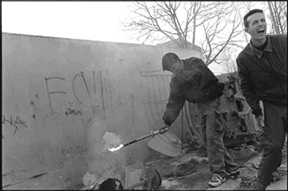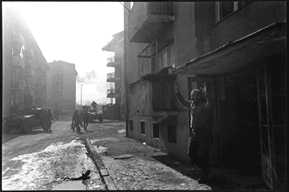|
Driving into Ilidza one late afternoon, clouds obscuring a beautiful
winter sunset, we noticed the smoke. In the next hour and a half, racing
through the seemingly peaceful streets, we realized that it had started.
The scorched-earth predictions, by which the Serbs would burn and trash the
suburbs before the transition to the Bosnians, had come to fruition. Over the
next couple of days the trend seemed to take over Ilidza. Besides the factories
and office buildings that were looted and then burned by bands of roving hooligans,
apartment buildings had also started to burn.
The metaphor of good neighbor, bad neighbor, began to unfold, where the bad neighbor, upon leaving,
would set fire to his own apartment, leaving those who stayed behind to deal with the situation. Of
course nobody came to help. The local firemen had gone, the Sarajevo firemen were too afraid, and it
was none of IFOR's business. That left old women, single mothers, retirees, alone to battle the blaze.
In the chaos and general indifference they organized themselves as bands, putting out fires with pails
and buckets, wise to the fact that in the end you have either good neighbors or bad neighbors.
|
|



